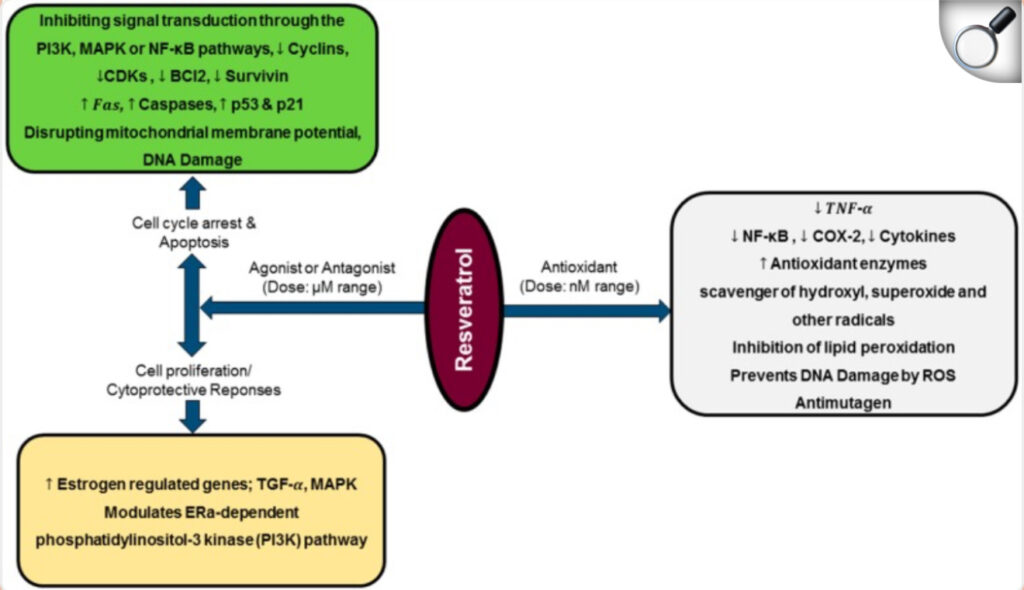Resveratrol 98%
Is a natural phytoalexin polyphenol that exhibits anti-oxidant, anti-inflammatory, anti-microbial, anti-carcinogenic, vasorelaxant, neuroprotective, cardioprotective and phytoestrogenic properties.
It has been detected in more than 70 plant species, especially in grapes’ skin, peanuts as well as in red wines.
As an anti-oxidant Resveratrol is able to inhibit the oxidation of low-density lipoproteins and increase the endothelial synthesis of nitric oxide by activating NO synthase.
It helps to lower blood pressure. Resveratrol acts against pathogens, including bacteria and fungi, and possesses a very high antioxidant potential.
Resveratrol has a positive effect on blood fats, with total cholesterol and body weight decreasing with good HDL cholesterol increasing.
Hydroxylradical scavenging activity, quenching the superoxide anion & inhibiting hydrogen peroxide production.
Found to have a glutathione-like activity protecting the cells from oxidative stress
Protects cells against hydrogen peroxide-induced oxidative stress.

Inhibits COX-1 & COX-2 activity. Prevents production of IL-2 & TNF-a. Dose-dependent suppression of production of IL-1a, IL-6 and TNFa.
Reduces the expression of inflammatory factors, RAGE, NF-kB and NADPH (NOX4).
Leads to decreases in PGE2, COX-2, IL-1B, IL-8, TNF-a (inflammatory mediator expression).
Reduction of oxidative stress & inflammation (iNOS, COX-2, ROS) which helps with mitigation of mitochondrial ROS.
Protects neurons from inflammatory damage, suppress neuro-inflammation mediated by microglia, relieve inflammation of the airway by asthma/airway remodeling.
Inhibits all carcinogenesis stages, targets intracellular signaling pathway components.
Inhibition of pro-hypertrophic signaling molecules, improvement of myocardial Ca+ handling, phosphorylation of prosurvival and stress signaling (MKP-1).
Resveratrol may activate the SIRT1 gene.
Can improve endothelial function in blood vessels.
Improved insulin sensitivity.
Combined with Quercetin improved glucose metabolism & memory performance, also improves bioavailability of trans-Resveratrol.

Keywords: Anti-Oxidant, Anti-Inflammatory, Anti-Aging, Anti-Microbial, Cardioprotective, Skin health, Weight Loss
Caution: Avoid in estrogen-sensitive women & patients on blood thinners. Does not have any side effects at small doses (1,000 mg), but over 2,500 mg per day some people will experience nausea, vomiting, and diarrhea. Doses were tolerated up to 5,000 mg/day.
Links:
General Information: https://pmc.ncbi.nlm.nih.gov/articles/PMC7796143/#:~:text=Resveratrol%20(3%2C4%E2%80%B2%2C,the%20inflammatory%20response%20are%20examined.
https://www.sciencedirect.com/science/article/abs/pii/S0167494322002825
https://www.healthline.com/nutrition/resveratrol
Anti-inflammatory: https://www.scielo.br/j/cta/a/yxpwKVj6yXJNw8NNFBpqRNr/
https://pubmed.ncbi.nlm.nih.gov/17959154/
Joint Pain: https://pmc.ncbi.nlm.nih.gov/articles/PMC3344210/
https://pubmed.ncbi.nlm.nih.gov/17115116/
Brain Function: https://pubmed.ncbi.nlm.nih.gov/28283884/
https://pmc.ncbi.nlm.nih.gov/articles/PMC4030174/
https://pubmed.ncbi.nlm.nih.gov/17077308/
https://pubmed.ncbi.nlm.nih.gov/22396249/
https://pubmed.ncbi.nlm.nih.gov/26845555/
https://pubmed.ncbi.nlm.nih.gov/28086917/
Impact on Blood Pressure: https://pubmed.ncbi.nlm.nih.gov/24731650/
https://pubmed.ncbi.nlm.nih.gov/25302702/
https://pubmed.ncbi.nlm.nih.gov/18259008/
Impact on Blood Fats: https://pubmed.ncbi.nlm.nih.gov/27085216/
https://pubmed.ncbi.nlm.nih.gov/27144581/
https://pubmed.ncbi.nlm.nih.gov/1752940/
https://pubmed.ncbi.nlm.nih.gov/22648627/
Anti-Aging: https://pubmed.ncbi.nlm.nih.gov/12939617/
https://pmc.ncbi.nlm.nih.gov/articles/PMC3799917/
https://pubmed.ncbi.nlm.nih.gov/15254550/

